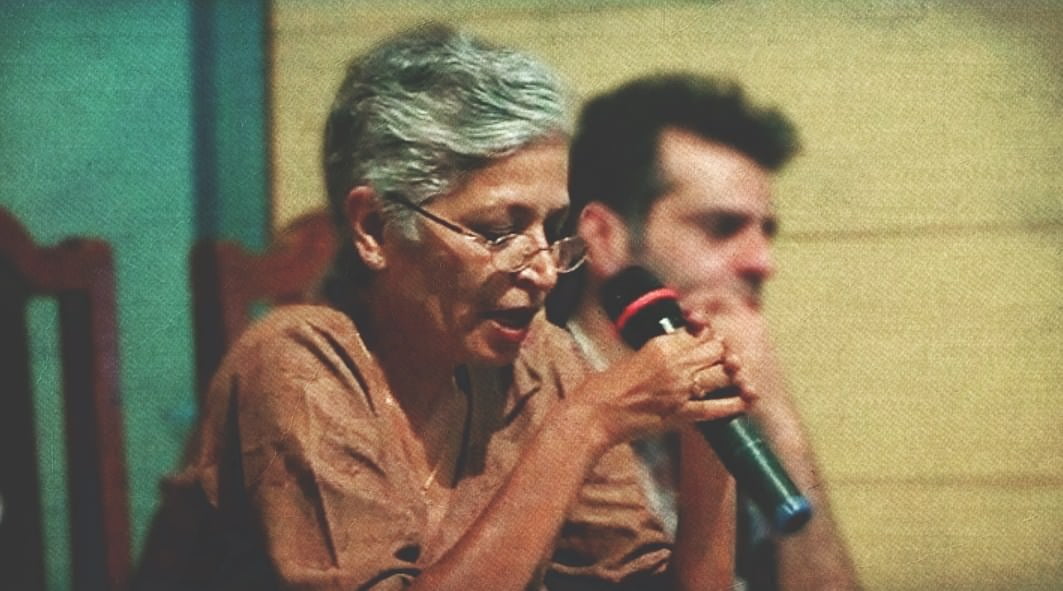On September 5th, 2017, Gauri Lankesh, founder-editor of Gauri Lankesh Patrike, a Kannada weekly publication, was shot dead at around 8pm outside her home in Rajarajeshwari Nagar, Bangalore by unidentified attackers. The magazine is known in Karnataka for its anti-establishment politics.
Until 2005, when she and her brother fell out, Gauri was also the editor of Lankesh Patrike, a Kannada weekly started by her father, P. Lankesh which she took over when he died. Taking on from the philosophy of Lankesh Patrike, Gauri too decided not to accept advertisements for Gauri Lankesh Patrike. Till date, the publication runs solely on subscriptions.
An outspoken critic of the BJP and Hindutvavadi forces, both nationally and in Karnataka, Gauri received frequent threats, both on her social media and otherwise, from those who disagreed with her politics. Gauri was convicted last year for defamation of BJP Karnataka members for a story she wrote in Gauri Lankesh Patrike.
She was also a part of a group working with the state government to bring Naxalites back into the mainstream, which the BJP tried to get her removed from. She was an active participant in local, regional politics, her activism and writing stretching from Karnataka across the whole of India.
Carrying on the legacy of her father’s publication with its strong, courageous writing, Gauri always told it like it is. After her defamation case, she told The Wire that she was scared for the future because of the stifling of speech. Her murder reaffirms only too harshly that the freedom of the press is under serious threat, with the space for honest, non-partisan journalism shrinking as each brave whistle-blower journalist is taken from us – when they lose their jobs, when they are stifled, when they are killed.
Also Read: Who Is Afraid Of Gauri Lankesh?
Here is a list of eight great pieces of writing by her in English, amongst numerous others in both Kannada and English. I selected these pieces as they traverse across a variety of themes, from womanhood, to caste and electoral systems.
1.‘Karnataka Has a Long History of Attacks on the Freedom of Press’

Credit: PTI
In this article of hers, Gauri detailed the stifling of the press in Karnataka over time by political parties, delving in detail into the treatment of various Kannada and other publications by different state governments. It is almost surreal in its prophetic quality, given how things turned out for her.
2. ‘Religion, Politics and the Naked Truth’
https://www.youtube.com/watch?time_continue=86&v=7E6Xur0745g
In an article on Jain Muni Tarun Sagar’s nude appearance in the Haryana assembly, Gauri wrote an incisive piece on how our constitutional and political practices have historically been tightly bound to Brahmanical Hinduism.
“Our secular constitution strictly separates religion from politics. But, in practice, religion plays a central role in all acts political. What else explains looking at ‘auspicious time’ before starting a legislative session, observing blind directions while laying the foundation stone for a government building, launching ships by breaking coconuts, throwing ‘baagina’ into dams praying for good rains?” she wrote.
3. ‘Last Refuge of the Scoundrel’
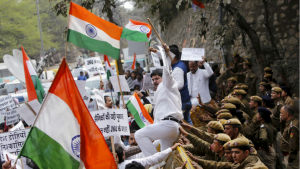
(The Patriots. Credits: (Reuters/Anindito Mukherjee)
“Patriotism is the last refuge of the scoundrel,” wrote Gauri Lankesh, in a scathing critique of the Sangh Parivar’s imposition of a singular nationalism in India. She traced the history of the Hindutva within the Indian independence movement, illustrating that many Hindu nationalists were actually British sympathizers and did not participate in the movement for a free India.
4. ‘Kiss Kiss, Bang Bang’
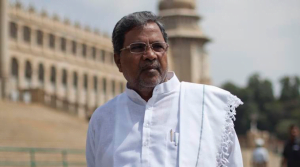
Siddaramaiah, the current CM of Karnataka, was kissed on the cheek by one of his constituents. Credit: The Indian Express.
On a lighter vein, Gauri wrote this fun piece about the culture and historicity of the practice of kissing in India when the Karnataka CM was embroiled in a social media storm when he was given a peck on the cheek by a woman supporter. “We Indians are not just an ignorant lot, we are also huge hypocrites. Hindus, who make up a large chunk of our population, worship in temples whose walls are adorned with erotic sculptures ranging from homosexuality to bestiality, but they look down on public displays of affection (PDA),” she critiqued.
5. ‘A State of Mind, Not a Brick Wall’
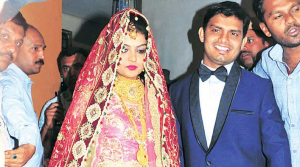
Credit: The Indian Express
In this piece, Gauri Lankesh chronicled a beautiful inter-faith wedding between a Hindu Vokkaliga woman and a Muslim in man in Karnataka while attacking the toxic endogamous practices of the caste system. “Caste is undoubtedly a disgusting social stratification system which needs to be destroyed if we as a society need to feel as one. But despite the efforts of several reformists and social movements, caste continues to have strong roots in our society. How can we try to change this?” she asked, answering that Ambedkar’s solution of inter-caste and inter-faith marriage was essential for the annihilation of caste.
6. ‘Highest Good & Lowest Lives’
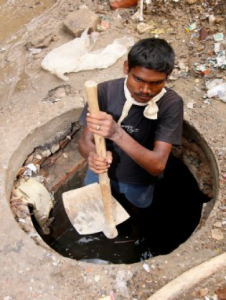
Credit: The Huffington Post
Gauri wrote angrily about the death of manual scavengers and the apathy and violence of even the highest rung of the political elite in India to their lives and realities. “Had any other community or profession lost so many of its people due to work related hazards there would have been an uproar. Since Safai Karmacharis are poor ‘untouchables’, no one cares. The attitude of our society towards them is most reprehensible,” she penned.
7. ‘How did Bengaluru become unsafe for women – and what can we do to reclaim our streets?’

Credit: YouTube
A Bangalorean through and through, Gauri wrote in this piece about being a woman in Bangalore, and how the privileges associated with that have changed over the years, in the aftermath of the mass molestation of women on New Years’ Eve on one of Bangalore’s busiest roads.
8. ‘One Vote for Birla, One Vote for Periasvamy’ and ‘Making Every Vote Count’
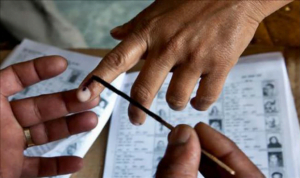
Credit: Daily Post
With her astute understanding of electoral politics, Gauri wrote here and here on the implications of the first-past-the-post system of vote tabulation that is followed in India and the implications of the proportional representation system in a two-part essay on democracy in India, the world’s largest democracy.
A journalist with over 30 years of writing experience, Gauri was as formidable a writer and activist at age 55 as ever, most recently in her editorial in the August 30th edition of Gauri Lankesh Patrike on the death of children in Gorakhpur due to government negligence. With a sardonic style characteristic of the publication, the cover story of this edition is titled ‘Karunaadige Benki Idalubandu Ondu Motteya Kathe’ (The Story Of A Bald Man Who Came To Set Fire To Karnataka), on Amit Shah’s recent trip to Karnataka.
I have looked up to Gauri Lankesh since I was a child, my mother telling me stories about her as a peer in college, a journalist-contemporary, and later the head of Lankesh Patrike. I have heard, and admired, so much about her, right from her fearless reporting, to her confidence and the surprising but effortless switch she made from an English writer to Kannada. As an aspiring journalist, Kannadiga and woman, the news of her death is extremely saddening. Now hearing about her conservative, patriarchal father who she revered anyway and a brother who pushed her out of the family publication, Gauri is my imperfectly perfect feminist icon – courageous, independent, contradictory, inspiring me to always do what is right; an inspiration in otherwise tiring, scary time.
Gauri is my imperfectly perfect feminist icon.
In a time when journalists are being persecuted by hypermasculine, hypernationalist forces for any writing and reporting that criticizes the ruling government, Hinduism, Brahmanism, Gauri fought the good fight, the one we realize we have to fight even harder in the aftermath of her murder. As Gauri Lankesh’s close friend and activist KS Vimala said, “They can kill her but they cannot kill her thoughts.” The hope for a larger space for a free press lives on through Gauri’s writing and the imagined memories of her courage that she leaves with us.
Featured Image Credit: Facebook
About the author(s)
Amala Dasarathi is a fourth-year law student. When she is not watching Bollywood movies, she spends her time understanding and unpacking the complexities surrounding gender, identity, caste, and class, among others.
